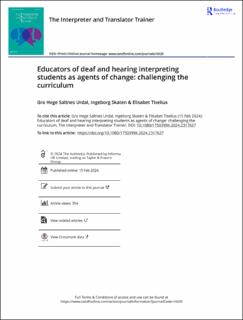Educators of deaf and hearing interpreting students as agents of change: challenging the curriculum
Peer reviewed, Journal article
Published version
Permanent lenke
https://hdl.handle.net/11250/3126092Utgivelsesdato
2024Metadata
Vis full innførselSamlinger
Originalversjon
10.1080/1750399X.2024.2317627Sammendrag
Educational systems change in top-down and bottom-up processes. One example is when authorities introduce a new curriculum, but it can also be changed by agents active in the system. In education, agents of change include educators, students and institutions. In this article, we explore the narratives of educators (n = 4) in the bachelor’s programme for signed language interpreter education (both deaf and hearing students) at Humak University of Applied Sciences in Helsinki, Finland. Data were collected through interviews conducted in 2016. We used content analysis and the theory of agency as a framework for analysis. Here, agency is understood as threefold building on the past, present and future. We explore the different dimensions of becoming an agent of change, being an agent of change and being an agent in a changing field. We find that within the context of this sign language interpreting programme, educators’ previous experiences, intercultural competence and ideas about the future contribute to changes in the curriculum and possibly to social change.

